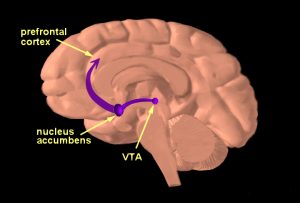When people are stressed, they often find themselves craving sugar, sweets or chocolate. Despite the fact that they can temporarily give some pleasure, they’re highly addictive and the overconsumption of sugar has many brain-related health consequences.

Sweets. Image from Pexels
Sugar Is Addictive
When sugar is consumed, it activates the tongue’s taste receptors. Then, signals are sent to the prefrontal cortex of the brain which stimulates the reward pathways and causes the release of dopamine, a natural chemical that makes us feel good.
The nucleus accumbeans is a part of the brain that receives dopamine and gives you a sense of pleasure. Activating the brain’s reward system is associated with it and activating it with an appropriate amount of sugar is harmless. However, when it’s activated too frequently, the signal from sugar consumption becomes weaker and it grows the tolerance to sugar. Then, people need to consume more in order to feel the same pleasure, causing addiction.
The rewarding system that sugar gives is very similar to what keeps alcoholics and drug addicts to stay addicted. According to a study, there is a high degree of overlap between brain regions involved in processing natural rewards, such as sugar, and drugs. This is why it’s hard for people to control the consumption of sugar after constant exposure, and creates a dangerous cycle of excessive cravings.

Prefrontal cortex and Nucleus accumbens. Image from Public Domain Files
Brain-Related Health Problems
Besides addiction, sugar has many other negative effects on the brain. For example, sugar affects the overeating sensor, lowering our ability to feel a sense of fullness. When sugar is consumed constantly, the brain’s anorexigenic oxytocin system that senses and prevents overeating becomes less sensitive and does not release hormones that signal the body that we are full. Thus, people are likely to continue eating even after they’ve had enough which then could contribute to obesity and diabetes.
Furthermore, sugar affects memory and learning skills by lowering the amount of the Brain-Derived Neurotrophic Factor (BDNF) factor. BDNF is what helps the brain with learning and forming new memories. Therefore, when BDNF is low, the ability to learn new things and our memory reduce. According to a study, researchers found out that a diet in high amount of sugar hinders learning and memory by literally slowing down the brain. The rats who over-consumed fructose (a form of sugar) ended up with impaired communication among brain cells.
Not All Sugars Is Bad
Although sugar has many negative effects on the brain, it is true that not all sugars is bad. Glucose, a form of sugar from carbohydrates like bread, fuels the cells throughout the body and is the primary source of energy for the brain. Thus, in order to manage your sugar intake, it’s important to avoid the consumption of fructose from processed foods and know that you only need a small amount of sugar per day as the World Health Organization recommends only 5% of daily caloric intake from sugar.
-Janet Lee
